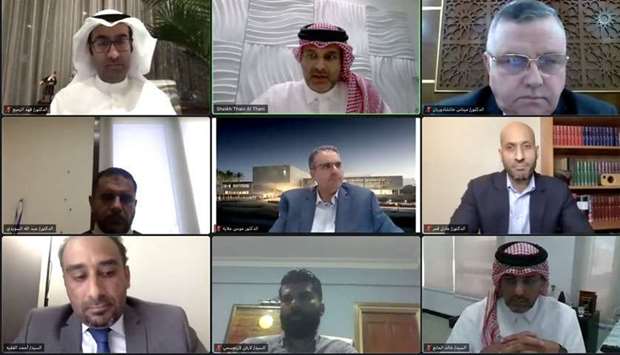Arab economies attach special importance to private sector companies as they play a pivotal role in advancing economic growth, an official of Qatar International Centre for Conciliation and Arbitration (Qicca) has said in a recent webinar.
Qicca board member for International Relations Sheikh Dr Thani bin Ali al-Thani made the statement during the event titled ‘Business Recovery and Resilience for Enterprises’, which aims to raise corporate awareness of companies in the recovery, stability, and sustainability of business.
Sheikh Thani added that the speed of economic recovery depends mainly on the ability of companies to resume usual activities, and to establish programmes to enhance productivity, promote competitiveness, and participation in the development plans developed by the state.
He noted that companies and business institutions faced a sharp decline of revenues and activities during the pandemic, prompting governments around the world to counter the impact of the health crisis, such as stimulus packages, postponement of loan payments, and exemptions in the payment of utilities and rent, among others.
“In view of the interest of countries to monitor the activity of emerging companies as a key driver of sustainable economic diversification, many companies sought to survive during the crisis by providing fast e-Commerce solutions or setting up quick communication platforms with their customers, but some of them stumbled as a result of changing circumstances and inability to fulfill of their obligations,” Sheikh Thani stressed.
Sheikh Thani also highlighted the legal challenges facing companies, and stressed that the pandemic has caused “great difficulties” for businesses to implement their contractual obligations as a case of force majeure or an emergency accident.
To solve these legal difficulties, he said it is necessary to establish mechanisms that allow contractors to negotiate and review contract terms or suspend the implementation of obligations for a specific period.
Badeal executive director for Business Solutions Dr Ahmed Alfaqeeh said the webinar is an extension of the guideline that was launched in October 2020, which dealt with the most important issues related to recovery and resilience of businesses.
Alfaqeeh also noted that Badael, in cooperation with Qicca, would introduce the ‘Business Resilience Index’ to concerned entities in Qatar, and affirmed that this would be beneficial for all institutions, especially small and medium-sized enterprises (SMEs).
Webinar panelists included Qicca general counsel Dr Minas Khatchadourian, who outlined avoiding commercial disputes by using alternative means, while Khalid al-Mana, executive director of Business Finance at Qatar Development Bank (QDB), delivered a presentation on ‘Current Business Models and the Future of SMEs’.
Associate professor at College of Law, Kuwait University, and adviser to the World Bank Dr Fahad al-Zumai spoke on laws resulting from the ‘Corona regulation’ and its impact on Kuwaiti companies.
Gamar Leadership Group CEO and teacher of Adaptive Leadership at Harvard Adel Gamar explored the role of adaptive leadership and capacity building in business recovery and resilience.
Associate professor at College of Business and Economics, Qatar University Abdullah al-Suwaidi, who is an expert in operations management and supply chain, highlighted the strategic transformation for supply chain management, while managing director and partner at Pemandu Associates Larvin Rengasamy spoke about managing business during and after crisis.

